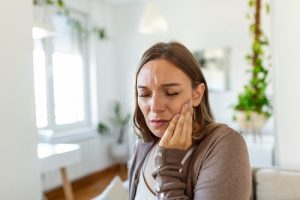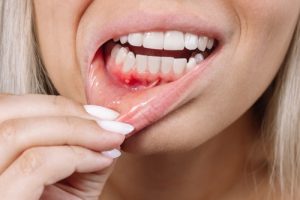How Smoking and Alcohol Increase Your Risk of Oral Cancer

Dr. Derek Scott, a trusted Kingwood dentist, provides essential information about how these habits affect your mouth and what you can do to reduce your risk. To detect early signs of oral cancer, contact our Kingwood dental office today by calling (281) 358-3125.
The Connection Between Smoking, Alcohol, and Oral Cancer
How Smoking Damages Oral Health
Tobacco products, including cigarettes, cigars, and smokeless tobacco, expose your mouth to harmful chemicals that weaken the cells in your oral tissues. This damage makes it easier for cancer to develop. Here’s how smoking increases your oral cancer risk:
- Direct Exposure to Carcinogens – Tobacco contains over 70 cancer-causing chemicals that come into direct contact with your mouth, throat, and lungs.
- Weakened Immune System – Smoking reduces your body’s ability to fight infections and repair damaged cells, increasing the likelihood of abnormal cell growth.
- Decreased Saliva Production – Saliva is essential for washing away harmful bacteria and toxins. Smoking reduces saliva flow, allowing harmful substances to linger in your mouth.
- Increased Risk of Leukoplakia – This condition causes thick, white patches in the mouth, which can develop into cancer over time.
If you live in Kingwood, TX, or nearby areas like New Caney and Huffman, quitting smoking can significantly reduce your risk and improve your overall health.
Alcohol and Oral Cancer
Alcohol, especially when consumed excessively, is another major contributor to oral cancer. Here’s why:
- Irritation of Oral Tissues – Alcohol is a strong irritant that dries out and damages the soft tissues in your mouth, making them more vulnerable to cancerous changes.
- Carcinogenic Byproducts – When your body processes alcohol, it produces acetaldehyde, a toxic byproduct that damages DNA and promotes cancer cell growth.
- Increased Absorption of Harmful Chemicals – Alcohol weakens the mucosal lining in your mouth, allowing harmful carcinogens from tobacco and other sources to penetrate more deeply.
If you regularly drink alcohol in Kingwood or surrounding areas like Splendora and The Woodlands, consider cutting back to lower your risk.
Smoking and Drinking
While smoking and alcohol alone are dangerous, combining the two significantly magnifies their cancer-causing effects. Alcohol increases the permeability of your oral tissues, allowing more tobacco toxins to enter your cells. This deadly duo raises the risk of oral cancer by up to 30 times compared to non-smokers and non-drinkers.
If you’re a smoker and drinker, taking steps to reduce these habits can greatly improve your health and longevity.
Signs and Symptoms of Oral Cancer

- Persistent mouth sores that don’t heal
- Red or white patches in your mouth
- Unexplained bleeding or pain in the mouth
- Difficulty chewing, swallowing, or speaking
- A lump or thickening in the cheek or throat
- Hoarseness or a chronic sore throat
If you’re Humble, Atascocita, or other nearby areas and notice any of these warning signs. You should seek immediate dental care with Dr. Scott by calling (281) 358-3125.
How to Lower Your Risk of Oral Cancer
Quit Smoking and Tobacco Use
Quitting smoking is one of the best ways to protect yourself from oral cancer. While it’s not easy, there are resources available to help you quit. Consider nicotine replacement therapy, support groups, or professional counseling.
Limit Alcohol Consumption
If you drink, do so in moderation. The CDC recommends no more than one drink per day for women and two for men. Avoid binge drinking, as it significantly raises cancer risks.
Schedule Regular Dental Checkups
Dr. Derek Scott and other dental professionals in Kingwood, TX, offer oral cancer screenings during routine exams. These screenings can detect early signs of cancer, increasing the chances of successful treatment.
Maintain Good Oral Hygiene
Brushing, flossing, and using an antimicrobial mouthwash can help remove harmful bacteria and toxins from your mouth. A healthy oral environment reduces your risk of developing cancer.
Adopt a Healthy Diet
Eating a diet rich in fruits and vegetables can strengthen your immune system and help your body fight off abnormal cell growth. Nutrients like vitamin C, vitamin E, and antioxidants play a crucial role in cancer prevention.
Early Detection and Treatment Saves Lives
If you live in Kingwood, TX, or surrounding areas like Huffman, Porter, or Atascocita, don’t wait until symptoms appear to take action. Regular dental visits with Dr. Derek Scott can help catch oral cancer in its earliest stages when it’s most treatable.
Your oral health is directly linked to your overall well-being. By quitting smoking, limiting alcohol, and staying proactive about dental care, you can reduce your risk of oral cancer and enjoy a healthier life. Schedule your oral cancer screening appointment with the best dentist in Kingwood, TX by calling (281) 358-3125.